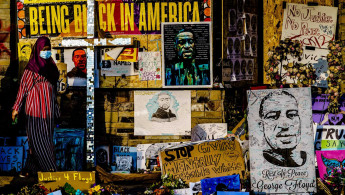Follow us on Facebook, Twitter and Instagram to stay connected
George Floyd murder trial set for next year
As the protests over racial injustice continued to reverberate nationwide, Hennepin County Judge Peter Cahill warned the four, their attorneys and state officials not to play the sensitive case through the news, even as one lawyer pointed out that President Donald Trump had already weighed in.
"I would like to see pre-trial publicity not include statements from family from either side, police or elected officials" about guilt or innocence, or the merits of the case, he told a court.
Derek Chauvin, the white officer filmed on May 25 pressing his knee into the handcuffed 46-year-old's neck for nearly eight minutes until he became unresponsive, faces second and third-degree murder charges.
Three others who were with Chauvin, 44, when they detained Floyd are charged with aiding and abetting a murder.
None of the four formally entered pleas.
Robert Paule, defending Tou Thao, one of the three charged with abetting the killing, said his client would plead not guilty, arguing that he adhered to police guidelines on use of force.
But Paule also expressed concerns over prejudicial comments and actions by state and national officials that could impact the trial.
"In this case, we have comments made, I believe, by President Trump," as well as Minnesota's governor, the mayor of Minneapolis, the Minnesota attorney general and others, Paule said.
He noted that Minnesota Attorney General Keith Ellison, whose office is leading the prosecution, and US Attorney Erica MacDonald met Floyd's family in Houston, adding that the trip was leaked to the press.
Paule said more publicity could lead to a push for a change of venue.
America stunned
Eric Nelson, the lawyer for Chauvin, said he might demand the judge legally order people involved to remain silent.
"If such public statements continue, I'll be seeking a gag order," Nelson said.
Chauvin, whose bail has been set at $1 million, appeared via video from the Oak Park Heights prison wearing an orange jumpsuit and a coronavirus mask.
The other defendants - Thao, Alexander Kueng and Thomas Lane - appeared in person.
The four, who were fired from the Minneapolis police force one day after Floyd's death, each face up to 40 years behind bars.
Read more: Arabs send US demonstrators advice on how to protest safely amid Black Lives Matter uprising
The bystander video of Floyd's death stunned and horrified Americans, igniting protests and riots in cities across the country and sparking a national debate on racism and police violence.
Floyd was detained for the minor charge of attempting to use a counterfeit $20 bill, and while in handcuffs, two of the officers held him down on the street while Chauvin pressed his knee to Floyd's neck and the fourth officer stood watch.
"I can't breathe," Floyd said on several occasions before losing consciousness.
An independent autopsy later revealed that Floyd died of suffocation due to the police officer's pressure on his neck and cited the cause of death as "homicide."
The original complaint said Floyd was pinned by the neck for eight minutes and 46 seconds but this was revised down by 60 seconds last week.
The judge set the next procedural hearing for September, with all parties needing to assemble a massive amount of evidence.
Prosecutor Matthew Frank, an assistant Minnesota attorney general, said so far there are more than 8,000 individual pages of discovery and hundreds of audio recordings and photographs date-stamped in the case.





 Follow the Middle East's top stories in English at The New Arab on Google News
Follow the Middle East's top stories in English at The New Arab on Google News


